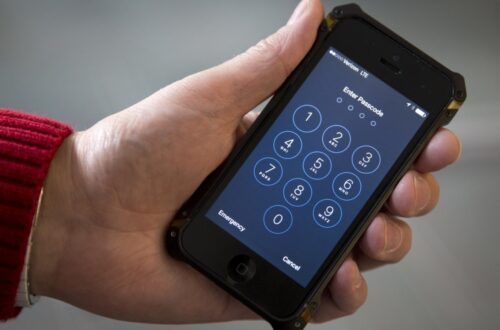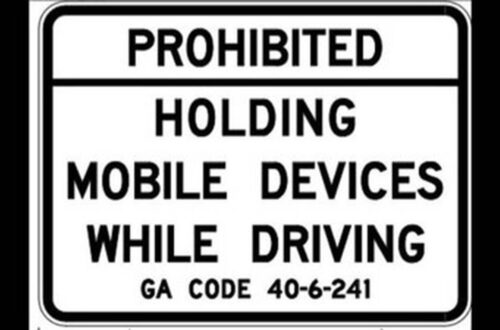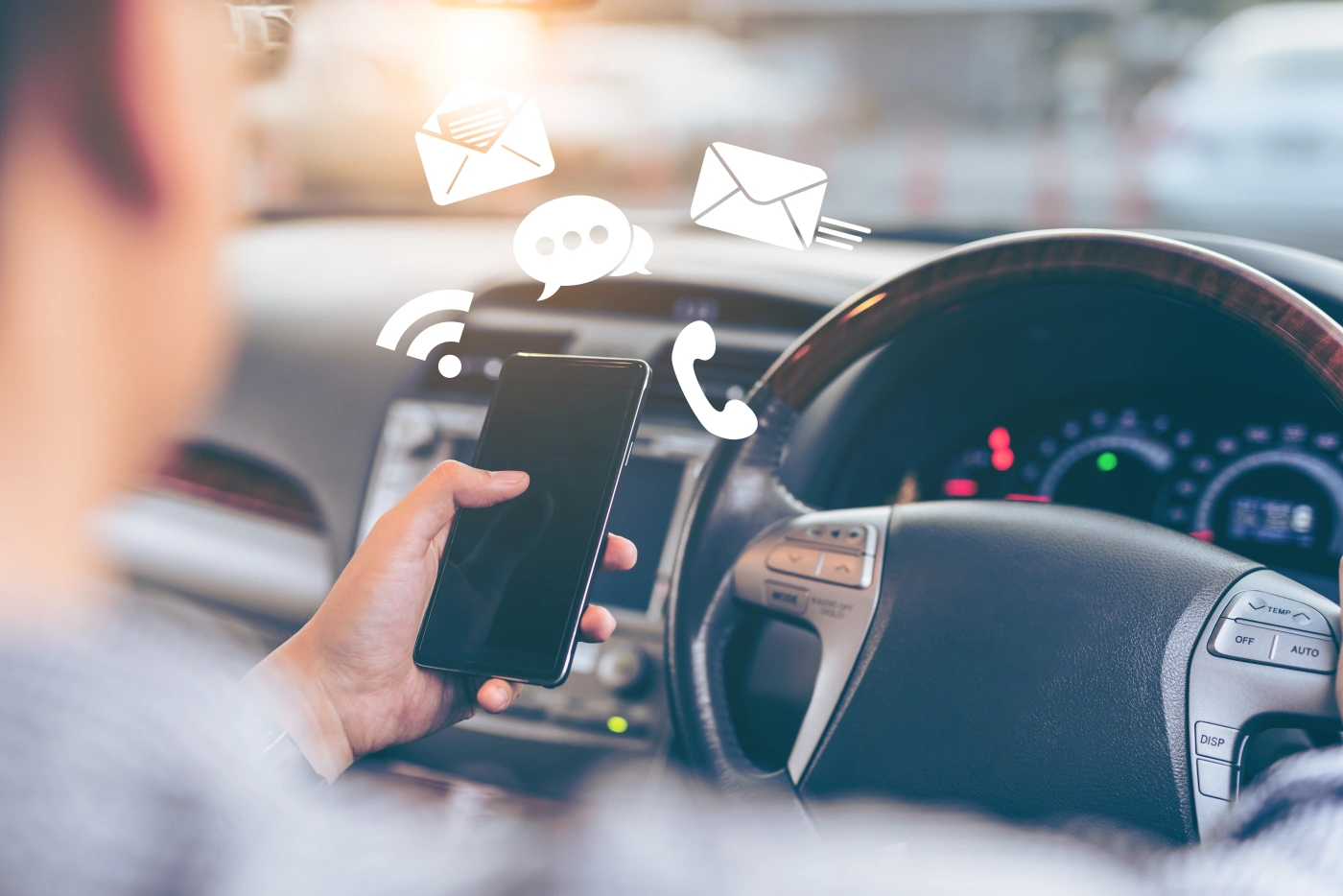Texting greatly impacts distracted driving accidents, causing cognitive, visual, and manual impairments that heighten the risk of crashes and near-misses on the road. Split attention from texting slows reaction time, impairs decision-making, and reduces awareness of surroundings. Glancing at the phone visually impairs you, leading to missed cues like brake lights. Manual distraction from texting can result in loss of control and delayed reactions to hazards. The statistics are alarming, with texting making a crash up to 23 times more likely. It is essential to prioritize safety while driving, especially concerning texting's role in accidents.
The Dangers of Texting While Driving
Texting while driving greatly increases the risk of accidents due to the cognitive distraction it causes. When you engage in texting behind the wheel, your brain's attention is divided between the task of driving and composing or reading messages. This split focus impairs your ability to react quickly to changes in traffic conditions, increasing the likelihood of a collision.
Research has shown that texting while driving is equivalent to driving after consuming four alcoholic drinks. Just like drunk driving, texting impairs your judgment, coordination, and reaction time. The consequences of texting while driving can be severe, leading to injuries, fatalities, and property damage.
Despite knowing the risks, many individuals continue to text while driving, underestimating the dangers they pose to themselves and others on the road. It is essential to prioritize safety and resist the urge to text while behind the wheel. Remember, no text is worth risking lives.
Cognitive Distraction and Texting
Driving while engaging in texting activities introduces a significant cognitive distraction that impairs your ability to focus on the road ahead. Your brain is forced to split its attention between the task of driving and the act of composing or reading a text message, leading to decreased cognitive performance. This cognitive distraction can have serious consequences, increasing the risk of accidents and jeopardizing your safety on the road.
Unordered List:
- Divided attention: Texting diverts your focus from the road, making it challenging to process driving-related information effectively.
- Delayed reaction time: Engaging in texting while driving can slow down your reaction time to unexpected events on the road.
- Impaired decision-making: The cognitive load from texting can impair your ability to make quick and sound decisions while driving.
- Reduced situational awareness: Texting can cause you to miss important cues and changes in the driving environment.
- Memory lapses: Cognitive distraction from texting can lead to memory lapses regarding your surroundings and the actions of other drivers.
Visual Impairment Due to Texting
When you glance down at your phone to read or send a text message while behind the wheel, your vital attention is diverted from the road, increasing the risk of accidents due to visual impairment. This split-second distraction can have serious consequences, as it takes your eyes off the road where they should be focused. Your brain needs time to refocus on the surroundings once you look back up, causing a delay in your ability to react to any potential hazards that may arise suddenly.
Visual impairment from texting while driving can lead to missed cues such as brake lights, pedestrians crossing the street, or sudden lane changes by other drivers. Your eyes play an essential role in safe driving, and any diversion from scanning the road ahead compromises your ability to make quick decisions. It only takes a moment of looking away to result in a collision or near-miss situation, highlighting the dangers of visual impairment caused by texting behind the wheel.
Manual Distraction From Texting
Your hands fumble on the phone's screen, diverting your attention from the task of driving safely. This manual distraction from texting poses a serious risk on the road. By taking your hands off the wheel to engage with your phone, you greatly increase the chances of causing an accident. Here are some key points to keep in mind regarding manual distraction from texting:
- Loss of Control: Your focus shifts from steering the vehicle, leading to potential swerving or drifting into other lanes.
- Delayed Reaction Time: In the event of sudden braking or obstacles on the road, your delayed response due to texting can result in a collision.
- Reduced Awareness: Engrossed in texting, you become less aware of your surroundings, including traffic signals, pedestrians, and other vehicles.
- Impaired Coordination: Trying to text while driving impairs your ability to make quick and precise maneuvers, increasing the likelihood of an accident.
- Increased Vulnerability: By being distracted, you are more susceptible to unexpected hazards, putting yourself and others at risk.
Stay safe on the road by avoiding manual distractions like texting while driving.
Texting-Related Accident Statistics
Focusing on the impact of texting while driving, let's examine the alarming statistics related to accidents caused by texting. Texting is a major contributor to road accidents, with studies showing that it makes a crash up to 23 times more likely. In addition, around 1.6 million accidents per year in the United States alone are caused by texting while driving. Shockingly, texting is responsible for about 25% of all car accidents. These accidents result in serious injuries, with texting and driving being six times more likely to cause an accident than driving under the influence.
Young drivers are particularly at risk, with 11 teenagers dying every day due to texting while driving. Furthermore, statistics reveal that 94% of teenagers understand the consequences of texting and driving, yet 35% of them still do it. These numbers highlight the urgent need for awareness and stricter enforcement of laws to prevent such tragedies on the road.
Impact of Texting on Driving Performance
Texting greatly impairs driving performance, posing a serious danger on the roads. When you text and drive, your attention is divided between the screen and the road, leading to decreased driving abilities. Here's how texting impacts your driving performance:
- Visual Distraction: Looking at your phone means you're not looking at the road.
- Manual Distraction: Typing messages takes your hands off the wheel.
- Cognitive Distraction: Your mind is focused on the conversation, not on driving.
- Slower Reaction Time: You may not react in time to avoid a potential hazard.
- Impaired Decision Making: Split focus hinders your ability to make quick, sound decisions.
These factors combined make texting while driving a dangerous activity. Remember, your safety and the safety of others on the road should always be the top priority. So, next time you hear that notification sound while driving, resist the urge to check your phone. It can wait.
Legal Consequences of Texting and Driving
The legal consequences of texting and driving can range from fines to license suspension or even criminal charges. In many states, texting while driving is considered a primary offense, meaning law enforcement can pull you over solely for that reason. The fines for texting and driving vary but can be substantial, often ranging from $100 to $500 for a first offense. Repeat offenses can result in higher fines or even license suspension. In more severe cases where texting leads to an accident causing injury or death, criminal charges such as vehicular manslaughter or reckless driving may apply, carrying significant penalties including imprisonment.
It's important to be aware of the specific laws in your state regarding texting and driving to avoid these consequences. Taking the risk of texting while driving not only endangers your safety and the safety of others on the road but can also have long-lasting legal implications. Be proactive in preventing distractions while driving to stay safe and out of legal trouble.
Strategies to Combat Texting While Driving
To reduce the risks of distracted driving due to texting, implementing practical strategies like setting your phone to Do Not Disturb mode while driving can greatly enhance road safety. Additionally, here are some effective strategies to combat texting while driving:
- Plan Ahead: Before starting your car, make sure you have set your GPS, playlist, and any necessary apps to minimize the need to touch your phone while driving.
- Designate a Co-Pilot: If you have a passenger with you, designate them as the person in charge of any necessary phone use during the drive.
- Use Apps: Consider installing apps that automatically respond to messages while you are driving to avoid the temptation of checking your phone.
- Pull Over: If you must send a message or reply to a text, pull over to a safe location before doing so.
- Educate Others: Spread awareness about the dangers of texting while driving and encourage others to adopt safe driving practices.
Frequently Asked Questions
How Does Texting While Driving Compare to Other Forms of Distracted Driving, Such as Eating or Talking on the Phone?
When you compare texting while driving to other distractions like eating or talking on the phone, texting requires visual, manual, and cognitive attention simultaneously, making it one of the most dangerous forms of distracted driving.
Are There Any Technological Solutions Available to Help Prevent Texting While Driving?
There are various technological solutions to prevent texting while driving, like apps that block notifications or hands-free voice commands. These tools can help you stay focused on the road and reduce the risks of distracted driving incidents.
What Are Some Common Misconceptions About the Dangers of Texting While Driving?
You might believe that quick glances at your phone while driving are harmless, but texting impairs your focus. It's not just about typing; even reading messages can lead to accidents. Stay safe by keeping your eyes on the road.
How Do Passengers in the Car Contribute to Distracted Driving Incidents Involving Texting?
When passengers in the car engage in distracting activities like talking loudly, playing music, or showing you something, they can divert your attention from the road, increasing the risk of accidents. Stay focused on driving.
Are There Any Psychological Factors That Make Some Individuals More Prone to Texting While Driving Than Others?
When it comes to texting while driving, some individuals may be more prone due to psychological factors like impulsiveness, addiction to technology, or a false sense of multitasking ability. These factors can increase the likelihood of risky behavior.
Conclusion
You now understand how texting while driving can lead to accidents due to cognitive distraction, visual impairment, and manual distraction. The statistics show the real impact of texting on driving performance, and the legal consequences are severe. Remember, it's never worth risking your life or the lives of others just to send a quick text. Stay safe on the road and prioritize your focus on driving.


